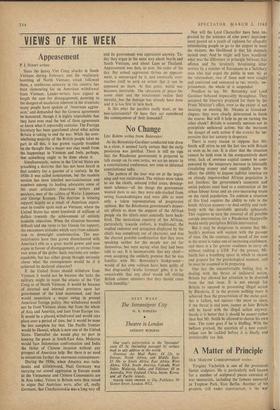No Change
LEO BARON writes from Bulawayo: As the Bottomley-Gardiner conducted tour drew to a close, it seemed fairly certain that the early pessimism was justified. There is still no sign that the Rhodesian government is prepared to talk except on its own terms; we are no nearer to a constitutional conference, nor even to informal constitutional talks.
The pattern of the tour was set at the begin- ning and was maintained. The visitors were taken to see the chiefs, selected tribal areas, develop- ment schemes—all the things the government wanted them to see; they were side-tracked from seeing Gonakudzingwa and were able to meet only a token representation of progressive opinion. But the Rhodesian government's desper- ate efforts to show the support of the African people via the chiefs mast assuredly have back- fired. The meticulous courtesy of the African, particularly towards visitors, is traditional; the studied rudeness and arrogance displayed by the chiefs was completely ,out of character, and was the clearest possible confirmation that they were speaking neither for the people nor yet for themselves, but were saying what they had been told to say. It is inconceivable that any chief— even accepting the unlikely premise that he was familiar with Mr. Bottomley's background— would of his own volition have been guilty of that disgraceful 'works foreman' gibe; it is in- conceivable that any chief would tell visiting British cabinet ministers that they should come 'with humility.' Nor vyill the Lord Chancellor have been im- pressed by the sentence of nine years' imprison- ment passed on a youth of eighteen for allegedly intimidating people to go to the airport to meet the visitors; the likelihood is that his stomach turned over. And he might well have wondered what was the difference in principle between that offence and the virulently threatening letter written by a number of Europeans to a Salisbury man who had urged the public to vote 'no at the referendum; two of those men were caught and convicted and sentenced to two month:, im- prisonment, the whole of it suspended.
Needless to say, Mr. Bottomley and Lord Gardiner behaved impeccably throughout. They accepted the itinerary prepared for them by the Prime Minister's office, even to the extent of not insisting on meeting Mr. Nkomo at Gonakud- zingwa; they were clearly determined to finish the course. But will it help to go on turning the other cheek? Britain is naturally anxious not to precipitate unilateral action; but she increases the danger of such action if she ci eates the im- pression that her anxiety is desperate.
There is every reason to suppose that Mr. Smith will strive to cut the last ties with Britain as soon as he can. It is clear that the situation cannot be held even in the comparatively short term; lack of overseas capital cannot be com- pensated by the temporary increase in internally circulating money and must rapidly have its effect; the ability to impose indirect taxation on an already impoverished African population is not limitless; the government's economic and social policies must lead to a contraction of the urban labour force and an ever-increasing strain on the rural population. To contain a situation of this kind requires the ability to rule in the South African manner—to deal swiftly and ruth- lessly with the inevitable sporadic upheavals. This requires in turn the removal of all possible. outside intervention, for a Rhodesian Sharpeville would surely precipitate British intervention.
But it may be dangerous to assume that Mr. Smith's position will weaken with the passage of time. On the contrary, the mood of the man in the street is today one of increasing confidence, and there is a far greater readiness to carry on without rushing a UDI. For the present, Mr. Smith has a breathing space in which to choose and prepare for the psychological moment, and he must be assumed to be preparing.
One has the uncomfortable feeling that in dealing with the threat of unilateral action, Britain has allowed her attention to be diverted from the real issue. It is not enough for Britain to succeed in preventing illegal action by Rhodesia, if in the process nothing more is achieved than the preservation of the status quo; this is failure, not success—the more so since, if the threat is real now, sooner or later Britain will be faced with the illegal action anyway. Surely it is better that it should be sooner rather than that Mr. Smith be allowed to choose his own time. The same goes if he is bluffing. With the balloon pricked, the question of a new consti- tution can be tackled before it is finally and irretrievably too late.


































 Previous page
Previous page